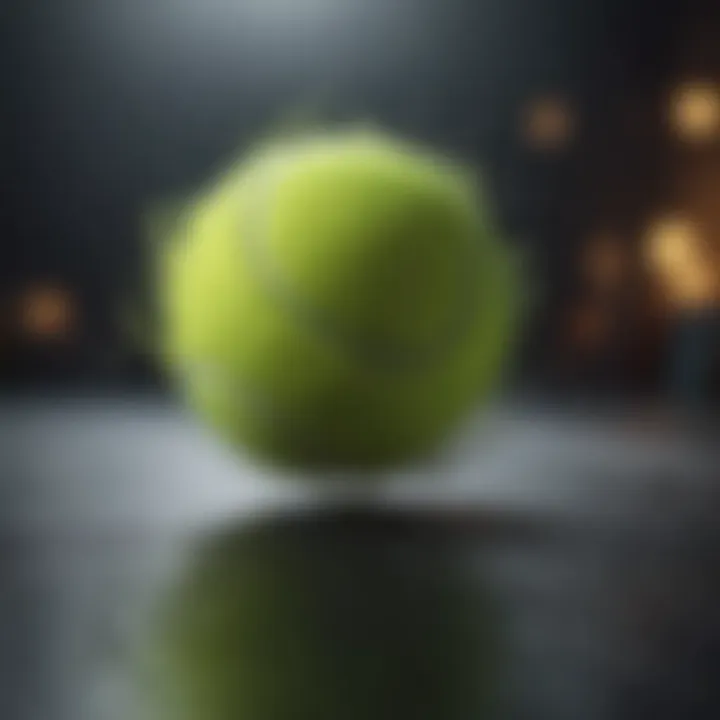Unlocking Performance: Insights from The Inner Game of Tennis


Book Title and Author Foreword
Timothy Gallwey's influential work, The Inner Game of Tennis, published in 1974, extends far beyond the confines of a traditional sports manual. Gallwey, a former tennis coach and a successful player, combines his passion for the game with insights from psychology and personal growth. His approach focuses on the mental challenges athletes face and how these obstacles influence their performance.
The key themes in the book revolve around the importance of self-awareness, concentration, and the harmonious relationship between mind and body. Gallwey presents a unique perspective that emphasizes that the real competition is often with oneself rather than with opponents.
Summary of Book Content
The Inner Game of Tennis delves deeply into the mental components essential for mastering any sport. Gallwey introduces the concept of two selves: Self 1, the critic, who voices doubts and negative thoughts, and Self 2, the performer, who naturally possesses the ability to execute skills.
The author underscores how many athletes inhibit their potential through negative self-talk. He encourages readers to quiet the inner critic and foster the instincts that enable natural performance. One prominent quote encapsulates this idea:
"The quality of your game is directly related to the quality of your thinking."
Gallwey’s observations extend to techniques for enhancing focus and integrating mindfulness into practice, which can lead to improved performance both on and off the court.
Three Lessons Learned
Lesson 1: The Power of Awareness
Awareness forms the foundation for any improvements in performance. Gallwey teaches that being aware of both physical sensations and thoughts creates a better understanding of one's game. Athletes should learn to observe their actions without judgment. This self-observation enhances clarity, leading to better decision-making.
Lesson 2: Trusting Self
The second self embodies natural abilities that often lie dormant due to overthinking. Gallwey advocates for trusting instincts and foregoing the need for constant analysis during gameplay. By accepting that mistakes are part of the learning process, athletes can free themselves from the burden of perfectionism.
Lesson 3: Focus on the Process
Rather than fixating on the outcome, Gallwey emphasizes the significance of focusing on the process. This involves concentrating on executing steps correctly instead of worrying about winning or losing. By shifting attention to the action itself, a player can enhance performance and satisfaction.
Practical Applications
The insights from The Inner Game of Tennis can be applied across various life aspects. For a professional working under pressure, self-awareness can lead to improved focus and decision-making in high-stress environments.
Tips for Implementation:
- Develop mindfulness practices such as meditation to cultivate awareness of thoughts and feelings.
- Approach challenges by encouraging self-trust; practice skills without over-analysis.
- Set process-oriented goals instead of solely outcome-based ones to measure growth.
Foreword to The Inner Game of Tennis
The exploration of the mental aspects of tennis is crucial for understanding the full scope of performance in the sport. Timothy Gallwey’s approach in The Inner Game of Tennis introduces essential psychological frameworks that can significantly impact how players perceive their abilities and challenges. Recognizing that success in tennis—or any sport—does not solely hinge on physical capabilities is a pivotal realization. Instead, it emphasizes the intricate balance between mental acuity and physical execution.
In this section, we will delve into the importance of this inner game, which refers to the mental processes and thought patterns that influence performance. The enlightening principles outlined by Gallwey assist readers in recognizing internal dialogues and emotions that can either hinder or facilitate athletic success.
Key Elements of the Inner Game
There are several vital elements that contribute to the overall grasp of the inner game in tennis:
- Self-1 and Self-2 Concept: Gallwey discusses the distinction between the conscious mind, which can be critical and doubting, and the intuitive self that executes movements and decisions.
- Awareness: Learning to observe one's thoughts and feelings without judgment can elevate performance and enhance learning.
- Mind-Body Interplay: The connection between mental awareness and physical action is fundamental. This interplay is crucial for athletes to perform at their peak.
Benefits of Understanding the Inner Game
Understanding the mental components of tennis brings various benefits:
- Enhanced Performance: Athletes can tap into their potential when they manage their thoughts and focus effectively.
- Greater Self-Awareness: Recognizing one’s strengths and weaknesses leads to improved training practices.
- Stress Management: Techniques derived from the inner game can assist in managing competitive pressure and anxiety.
Considerations
Exploring the inner game requires reflection. Athletes face multiple distractions and pressures. Addressing these requires not only practice but also patience and commitment to self-discovery. Engaging in this journey can foster resilience and adaptability—skills beneficial beyond the court.
"The player who is about to learn can have a life changing experience when awareness becomes the cornerstone of their practice."
Author Background and Motivation
The connection between an author and their work often reveals depths and motivations that enrich the reader's understanding. Timothy Gallwey's journey has significantly shaped the insights presented in "The Inner Game of Tennis." This section explores Gallwey's personal experiences and motivations, reflecting on how they contribute to the overall message of self-discovery and psychological performance.
Timothy Gallwey's Journey
Timothy Gallwey began his career as a tennis coach, where he quickly recognized a recurring theme among his students: the battle that occurs not just on the physical court, but also within their minds. He became aware that many of them were hindered by self-doubt and overthinking. This realization prompted him to investigate how the mind interacts with performance, leading him to explore the idea of the "inner game."
The essence of Gallwey's journey is his focus on harnessing the mental aspect of sports. This emphasis on mental resilience has been pivotal in his approach to coaching. He understood that to excel, athletes must navigate their own mental obstacles. This understanding was not limited to tennis; it extended to all realms of performance. His experiences cultivated a deep interest in how self-awareness can enhance decision-making and build confidence.
Gallwey’s reflections on his teaching experiences led to a rich exploration of how self-awareness can be a powerful tool in sports and beyond. His journey encourages readers to reflect on their experiences, inviting them to recognize their own inner dialogues that influence performance.
Inspiration for Writing
Gallwey's decision to write "The Inner Game of Tennis" stemmed from a desire to share the profound insights he gained through his experiences. He saw the overwhelming effects of anxiety and pressure in sports and wanted to offer a new perspective. He aimed to inspire others to view their challenges as opportunities for growth.
In writing the book, his intention was not to provide a manual of techniques but rather to guide readers toward self-discovery. The core motivation was to encourage individuals to trust themselves. Through various techniques, Gallwey emphasizes awareness, self-trust, and the importance of listening to one's intuition.
This drive to empower individuals resonates through his work. He encourages readers to examine their own thoughts critically and fosters a sense of ownership over their personal growth. This perspective has made his writing relevant not only for athletes but for anyone looking to enhance their performance in any aspect of life. The insights presented serve as both a comprehensive guide and a profound source of inspiration for self-improvement.


Core Philosophy of The Inner Game
The core philosophy of The Inner Game is essential in understanding how psychological factors can significantly influence athletic performance and personal growth. At its heart, this philosophy proposes that the key to improvement lies not just in external skills and techniques, but also in mastering the internal dialogue that can either hinder or enhance performance.
This approach emphasizes the dynamic relationship between the mind and body. Athletes often struggle with thoughts and feelings that create barriers to executing their physical abilities. By addressing this internal landscape, individuals can unlock their true potential.
Benefits of Understanding the Core Philosophy
The benefits of grasping this philosophy are manifold. For one, it fosters a deeper self-awareness. Individuals learn to recognize when self-doubt or negative thoughts invade their mindset. Instead of ignoring or suppressing these feelings, the Inner Game encourages acknowledgment and acceptance, allowing for constructive engagement.
Furthermore, the concepts outlined in The Inner Game can translate effectively into various aspects of life beyond sports. Improved self-awareness leads to enhanced decision-making abilities in personal and professional contexts. Individuals who learn to navigate their internal dialogue can better handle stress, increase resilience, and cultivate a more positive framework for growth.
Key Considerations
A critical consideration in adopting this philosophy is the essential balance between the competing selves described in the text: Self 1 and Self 2. Self 1 represents the critical, judgmental part of our psyche, while Self 2 embodies the intuitive, instinctual self that knows how to perform without overthinking. Understanding this duality allows athletes to shift focus away from excessive criticism and redirect attention toward nurturing instincts and innate abilities.
Ultimately, embracing the core philosophy of the Inner Game can radically transform how individuals approach not only tennis but life itself. It opens avenues towards greater self-discovery, continuous improvement, and a more harmonious existence between mind and body.
The Concept of Self and Self
In The Inner Game, Timothy Gallwey introduces us to the compelling concept of Self 1 and Self 2, which highlights the inner conflict many individuals face during performance. Self 1 is often seen as the self-critical voice that pass judgment on skills and performance, generating anxiety and self-doubt. This intrusive self-talk disrupts focus and can paralyze the athlete's ability to perform.
On the other hand, Self 2 represents the inherent capabilities within each person. Self 2 is the part that embodies instinct, natural skill, and the ability to perform effortlessly. Recognizing the presence of these two selves is crucial for performers, as success hinges upon the ability to quiet Self 1 and listen to the more intuitive Self 2.
To foster an harmonious relationship between these two selves, one must train the mind to acknowledge thoughts from Self 1 without allowing them to dictate actions. Practicing mindfulness and self-compassion can assist in this process. By learning to trust in oneself, individuals can experience fluidity in performance, be it in sports or in their daily lives.
The Role of Awareness in Performance
Awareness serves as the foundation of effective performance in sports and beyond. An individual's ability to stay present greatly influences the outcome of any task, including tennis. The Inner Game posits that true mastery stems from being highly aware of both one's physical state and mental condition.
Developing awareness means being conscious of sensations, emotions, and the environment without letting distractions interfere. For athletes, this translates into recognizing the nuances of their bodies, such as balance, posture, and rhythm—all integral for optimizing performance.
Additionally, increased awareness allows for real-time adjustments. For example, if a player notices a dip in their swing or feels tension in their grip, they can make minor adjustments that can lead to significant improvements.
The Nature of Learning
Understanding the nature of learning is fundamental to grasping the psychological concepts behind The Inner Game of Tennis. In sports, and life, the learning process is not linear; it is often complex and influenced by various factors. Timothy Gallwey emphasizes that effective learning occurs through self-discovery and experience. This approach contrasts with traditional methods that focus heavily on instructive teaching. By focusing on how one learns, athletes can discover their capabilities and potentials in a deeper and more meaningful way. There are several key elements to consider when examining the nature of learning within this context.
- Personal Experience: Engaging fully in practice allows a player to resonate with the game on an individual level. This can lead to more profound understanding and retention of skills.
- Self-Reflection: Players must reflect on their performances to understand their markers of success and areas of improvement. This self-awareness promotes a growth mindset.
- Practical Application: Learning by doing enhances one’s adaptability. Through real competition and practice scenarios, individuals can quickly learn what strategies work best for them.
Adopting these elements can yield significant benefits for players. Enhanced awareness of one's strengths and weaknesses fosters personal growth. Moreover, developing resilience through effective learning leads to better performance under pressure.
Learning through Experience
Learning through personal experience is critical in the framework of The Inner Game. It underscores the idea that mastery transcends mere replication of skills; it embodies a deeper comprehension of those skills through trial and encounter. Gallwey posits that true learning occurs when one immerses oneself in active practice. This model does not advocate for memorization of techniques but rather the internalization of skills through engagement.
- Trial and Error: Mistakes are pivotal. They provide essential lessons that cannot be effectively transmitted through verbal instructions alone. Each error lays the groundwork for future success.
- Active Participation: Engaging in play helps to build muscle memory and enhance decision-making skills. The more one plays, the more instinctive responses can become.
- Situational Awareness: By experiencing different game situations, players can develop a sense of timing and spatial awareness that is crucial in performance contexts.
In sum, learning through experience is a dynamic process. It fosters growth and adaptation. Players learn to adjust their techniques and strategies based on the feedback garnered from live situations.
The Importance of Feedback
Feedback plays a vital role in the learning process described in The Inner Game. Gallwey highlights that understanding and processing feedback leads to enhanced performance. Feedback is not merely external criticism; it can be internal, deriving from one's responses and feelings during practice or play. Effective feedback mechanisms build on the notion that awareness is critical for improvement.
- Types of Feedback: There are two main categories—intrinsic and extrinsic. Intrinsic feedback comes from within, while extrinsic feedback is provided by coaches or spectators. Both are important for holistic learning.
- Evolving Learning: The feedback loop is fundamental. It propels players to make adjustments and enhances various skills over time. This continuous cycle reinforces the learning process, resulting in gradual enhancement of abilities.
- Intrinsic Feedback: Players must cultivate their ability to analyze their own performances. Understanding physical sensations and emotional reactions during play can guide improvement. For example, feeling tension can indicate a lack of focus that needs addressing.
- Extrinsic Feedback: Coaches can offer valuable insights that challenge a player’s perspective. Constructive criticism can reveal patterns that players may overlook. However, it is vital to filter this information to avoid overwhelming oneself.
Effective feedback transforms experiences into lessons, guiding an athlete's journey towards self-discovery and competence.
To conclude, both elements, learning through experience and the importance of feedback, work synergistically in sports and personal growth. Adopting these concepts helps players excel in their game, while also transcending sports to enrich other facets of life.
Mindfulness and Focus
In sports, mindfulness and focus play a crucial role. They are not just about being aware of the present moment but also about maintaining attention on the task at hand. The 'Inner Game of Tennis' emphasizes that cultivating these skills can deeply enhance performance. When players learn to focus their minds, they can perform at a higher level. This involves quieting the inner dialogue that often leads to distractions. The benefits include better decision-making and improved execution of physical skills.
Mindfulness encourages athletes to be present, allowing them to respond more effectively to changing dynamics during play. It minimizes anxiety related to performance, creating a calmer mental state. By being mindful, athletes can recognize and manage their thoughts and emotions better, which is essential for both practice and competition.
Techniques to Enhance Concentration
To sharpen concentration, several techniques can be utilized. Here are some effective methods:
- Breathing Exercises: Simple techniques like deep breathing can help ground the mind. Focusing on breath allows for the clearing of distractions.
- Visualization: Imagining successful performance can condition the mind positively. Athletes may visualize each stroke and movement as they want it to occur.
- Setting Intentions: Clear, concise goals for each practice or match provide focus. Athletes should outline what they wish to achieve in specific details.
- Routine Development: Having a consistent pre-performance routine helps in centering one’s thoughts and actions. It can create a signal to the mind that it is time to focus.
- Mindfulness Meditation: Regular practice can improve overall concentration. Even a few minutes each day can train the mind to maintain focus during matches.
Incorporating these strategies into daily training enhances not just athletic focus but also applies to various aspects of life.
The Impact of Distractions
Distractions can severely impact performance. In tennis, they can come from various sources. External factors like cheering crowds or environmental conditions often break concentration. Internal distractions such as self-doubt or thoughts about past mistakes can be equally disruptive.
Understanding the nature of distractions and their effects is vital. Here are some key points regarding their impact:
- Performance Decrease: Distractions can lead to dropped points and mistakes, affecting overall game performance.
- Mental Fatigue: Constant mental juggling can exhaust the athlete. This often leads to poorer decisions over time.
- Loss of Flow: A concentrated mindset often leads to a state of 'flow,' known for peak performance. Disruptions can hinder this experience.
To mitigate distractions, awareness is essential. Players who recognize when their focus drifts can take steps to bring their attention back to the task. Practicing mindfulness techniques can help develop this crucial awareness. By training to minimize distractions, athletes can improve their overall performance, both in tennis and in other life pursuits.
Self-Trust and Inner Confidence


Self-trust and inner confidence play essential roles in the journey of self-discovery and performance improvement. These concepts not only enhance athletic performance but also improve decision-making outside the sport. When an individual possesses a solid belief in their abilities, they can handle challenges more effectively. Mistrust or uncertainty can result in hesitation and missed opportunities.
The relationship between self-trust and inner confidence is vital. They are interlinked; when self-trust is nurtured, confidence naturally follows. Trusting oneself allows an individual to focus on the process rather than the outcomes, thus reducing anxiety. This focus is crucial for optimal performance, where clarity gives rise to effective action.
Key benefits of cultivating self-trust include:
- Increased resilience: When faced with setbacks, those who trust their abilities are more likely to rebound and continue striving.
- Enhanced performance: With reduced self-doubt, there is a clear path to improve skills in both practice and competition circumstances.
- Better decision-making: Self-trust allows players to make choices based on internal sensations rather than external pressures.
In sports, as in life, self-trust fosters a deeper connection with one's capabilities, leading to transformative growth.
Building Self-Trust in Practice
To build self-trust, athletes must engage in regular and deliberate practice. This is not simply repetitive actions; it involves setting specific goals and achieving them over time. Here are some effective strategies to enhance self-trust:
- Set realistic goals: Smaller, manageable goals create a framework that promotes steady progress. Achieving these incremental goals helps build trust in one’s abilities.
- Reflect on successes: Taking time to review past achievements reinforces the belief that one is capable. Consider keeping a journal to document wins, no matter how small.
- Seek consistent feedback: Genuine feedback from coaches and peers can create a trusting environment. Positive reinforcement helps in recognizing improvements.
By integrating these strategies into practice routines, athletes can foster a sense of self-trust that becomes foundational to their performance.
Overcoming Self-Doubt
Self-doubt can be an insidious barrier to achieving one's potential. It can disrupt performance and cloud judgment, preventing individuals from executing plans effectively. Addressing self-doubt involves both awareness and action:
- Acknowledge it: Recognizing when self-doubt emerges is the first step. This awareness brings it into consciousness, making it easier to address.
- Challenge negative thoughts: Replace negative self-talk with positive affirmations. For instance, instead of saying, "I can’t do this," reframe thoughts to, "I am improving each day."
- Visualization techniques: Visualizing success can shift one's mindset, creating a bridge between current capabilities and future potential.
Self-doubt is a common experience; however, learning to confront it can lead to greater self-awareness and confidence.
The Role of Intuition
Intuition plays a significant role in achieving peak performance, particularly in high-stakes environments like tennis. This instinctual response is vital for athletes, enabling them to make rapid decisions without overthinking. In the context of Timothy Gallwey's philosophy in The Inner Game of Tennis, intuition is not simply a subjective feeling but a fundamental aspect of effective performance.
By understanding the nuances of intuitive decision-making, players can enhance their ability to respond fluidly during competition. Intuition allows athletes to tap into their subconscious mind, drawing from experience and knowledge to shape their actions. This inherent ability fosters quick and almost automatic decisions that can ultimately determine the outcome of a match. Moreover, recognizing the power of intuition opens pathways for personal and sport-related growth, as it encourages athletes to trust themselves and their capabilities.
"Intuition is the link between the conscious mind and the deeper levels of awareness."
Understanding Intuitive Decision-Making
The process of intuitive decision-making involves tapping into mental processes that operate below the level of conscious thought. When athletes experience situations, they gather information that their brains subconsciously analyze. This rapid analysis can lead to split-second decisions that feel instinctual. Such decisions are often grounded in learned experiences and patterns that the mind recognizes.
- Benefits of Intuition:
- Considerations:
- Speeds up the decision-making process.
- Reduces the impact of anxiety.
- Allows for a more authentic expression of skill.
- Over-reliance on intuition can lead to erratic performances.
- Balancing instinct with strategic planning enhances overall game performance.
In practice, intuitive decision-making can manifest as a player instinctively positioning themselves for a shot or altering their strategy based on their opponent’s movements. Developing this skill requires practice and patience, allowing the mind to learn from past matches and experiences.
Trusting Your Gut in Performance
Trusting one’s gut can be a challenging yet essential aspect of competitive sports. It requires an athlete to differentiate between helpful instincts and detrimental doubts. Gallwey stresses the importance of fostering this internal trust, as it can often lead to improved performance.
Engaging in reflective practice helps athletes build confidence in their instincts. This can be achieved through methods like:
- Regular Mindfulness Exercises: To improve awareness of one’s thoughts and feelings.
- Visualisation Techniques: To mentally rehearse scenarios and outcomes.
- Focused Feedback Loops: To learn from past decisions made under pressure.
When athletes trust their intuition, they tend to perform better. This inner confidence enables them to approach situations with a clear mind rather than hesitating or overthinking. As a result, the athlete is more likely to execute their skills effectively, even in the face of pressure.
Practical Applications of Inner Game Concepts
The practical applications of the concepts presented in "The Inner Game of Tennis" reveal their significance across various domains. Timothy Gallwey's work emphasizes how internal mental mechanisms can be harnessed not only in athletics but also in daily pursuits. This understanding allows individuals to maximize their performance levels.
Translating Lessons to Other Sports
The principles elaborated in the inner game extend well beyond tennis. Athletes from various disciplines can benefit from focusing on self-awareness and inner dialogue. For instance, in basketball, players can learn to quiet their minds, similar to a tennis player focusing on the ball.
Key takeaways include:
- Mindfulness in Decision-Making: Just as a tennis player must decide the right moment to swing, athletes in other sports can enhance their decision-making through mindfulness techniques. This heightened awareness can improve reaction times and accuracy.
- Self-TrusT: Athletes need to trust their instincts. Gallwey describes this as a crucial element in performance. Whether it's hitting a perfect golf shot or making a fast break in soccer, self-trust plays a vital role.
- Feedback Mechanisms: Continuous feedback and reflection help an athlete improve. Implementing self-assessment strategies allows sports professionals to adjust their skills meaningfully, enhancing performance.
By incorporating these practices, athletes see improvements not just in outcomes but also in overall enjoyment of their sport.
Implications for Everyday Life
The impact of the inner game principles also resonates in non-sporting contexts. Individuals can apply these concepts to enhance personal development and everyday interactions. The interrelation between focus, awareness, and emotional intelligence plays a role in various daily experiences.
Consider the following ( ways ) to implement these concepts:
- Emotional Regulation: Understanding emotions can lead to better personal interactions. By recognizing emotional triggers, people can respond rather than react, which fosters healthier relationships.
- Goal Setting: The application of self-awareness in everyday routines can lead to more effective goal achievement. Clearly identifying personal goals and what might hinder them allows for clearer planning.
- Mindful Practices: Integrating mindfulness into daily life helps with stress management. Techniques such as meditation or focused breathing can result in a calmer state of mind, translating into enhanced productivity.
"The quality of our thoughts directly impacts our actions. Mastering the inner game is essential for achieving success in any field."
Emotional Intelligence and Performance
Emotional intelligence plays a critical role in performance, particularly in high-stakes environments like sports. In the context of tennis, where both mental and physical elements are paramount, the ability to understand and manage emotions can lead to improved outcomes on and off the court. This section explores how emotional intelligence impacts the inner game of tennis, focusing on key benefits such as enhanced focus, better decision-making, and a stronger connection with self and others.


High emotional intelligence can help athletes navigate the complexities of competitive play. Players often face intense pressure, and how they manage their emotional state influences their performance. Understanding one’s emotional triggers can lead to a more composed demeanor, helping players respond to challenges with clarity rather than impulsiveness.
Handling Emotions on the Court
Handling emotions during a match is crucial for success. Emotions such as frustration, anxiety, and excitement can manifest strongly, affecting concentration and performance. It is vital for players to develop strategies that allow them to maintain emotional stability.
- Recognizing Emotions: Acknowledging feelings as they arise is the first step. Being aware helps athletes make informed choices rather than acting on impulse.
- Breathing Techniques: Controlled breathing can help to calm nerves. Taking deep, intentional breaths during breaks between points can create a sense of relaxation.
- Visualization: Envisioning successful moments or the desired outcome can help reshape emotional experiences. This technique can counter negative feelings with positive imagery.
"Understanding and managing one's emotions can create a pathway to consistent performance, turning obstacles into opportunities for growth."
Emotional Regulation Techniques
Emotional regulation techniques are essential tools for athletes looking to enhance their emotional intelligence. These techniques equip players to handle stressful situations effectively.
- Self-Talk: Positive self-talk can modify perception and reduce anxiety. By reframing negative thoughts, players can maintain motivation and confidence.
- Mindfulness Practices: Engaging in mindfulness allows players to stay present. Techniques such as meditation or focused attention exercises can cultivate awareness of emotions and thoughts without judgment.
- Goal Setting: Setting specific, measurable goals contributes to emotional regulation. When athletes target achievable objectives, it offers a structured pathway leading to satisfaction and reduces feelings of being overwhelmed.
By integrating these emotional regulation techniques, players can experience a profound impact on their performance. Emotional intelligence is not merely about feeling; it is about action, strategic thinking, and resilience, all of which are crucial in the competitive arena of tennis.
Critiques and Limitations of The Inner Game
Understanding the critiques and limitations of ‘The Inner Game of Tennis’ is essential for fully grasping its impact and relevance. While Timothy Gallwey’s concepts have profoundly influenced the approach to sports psychology, the perspectives on the effectiveness and applicability of his ideas are varied. It is crucial to evaluate both the strengths and weaknesses of the inner game philosophy to appreciate its role in self-discovery and performance enhancement fully.
Reception of the Book
Since its publication, ‘The Inner Game of Tennis’ has generated a diverse range of reactions. On one hand, many athletes and coaches recognize the value of Gallwey's insights into self-awareness and the mental aspects of performance. The book has been widely praised for breaking from traditional coaching methods, introducing a holistic approach that includes mindfulness and self-reflection. Large number of players, from amateurs to professionals, report significant improvements in their game by applying these principles.
On the other hand, some critics argue that the philosophies espoused in the book can be overly simplistic. They claim that while the ideas of Self 1 and Self 2 might resonate at a surface level, they do not address the complexities of athletic performance in competitive environments. For example, factors such as physical conditioning, strategy, and even external influences like coaching styles and teammate dynamics are not fully explored in Gallwey’s framework. This raises questions about the comprehensive applicability of the inner game concepts.
Contemporary Relevance
The inner game principles find their relevancy in today’s sports landscape, but this relevance is not without contention. In an era where data analytics and technology play a significant role in sports performance, some find the focus on introspection and mental coaching to be at odds with a more scientific approach. Critics suggest that reliance on psychological strategies without sufficient empirical backing can lead to superficial understanding.
Despite these criticisms, many contemporary athletes, including those in highly competitive sports, are increasingly incorporating mental conditioning into their training regimens. The principles of self-discovery, awareness, and emotional management advocated by Gallwey are now seen as key components of a total athlete development program. For example, techniques such as visualization and mindfulness meditation have gained popularity as methods to enhance performance while maintaining a grounded approach to the physical demands of the sport.
In summary, while ‘The Inner Game of Tennis’ continues to influence how individuals approach performance and self-discovery, its critiques point to the need for a broader framework. A combined approach that incorporates both psychological principles and practical strategies might best equip athletes for success in modern sports.
“The mind is everything. What you think you become.” - Buddha
This quote resonates particularly with the themes from Gallwey’s work, yet emphasizes an important point: balance is essential. Recognizing the limitations of the inner game can lead to a more comprehensive understanding of both the mind and body in performance.
Finale: Insights for Personal and Professional Growth
The conclusion provides a critical synthesis of the insights presented throughout the article. It is in this section where readers can reflect on their journey through the Inner Game concepts. The discussion encapsulates how these ideas can inform personal and professional development, bridging theory with practical application.
The significance of self-awareness is paramount. As individuals become more aware of their thought patterns and emotional responses, they can navigate challenges with greater ease. This understanding not only enhances performance in sports like tennis but also translates into improved decision-making in professional environments.
Additionally, the focus on mindfulness and emotional regulation contributes to enhanced resilience. Establishing a routine of self-trust allows individuals to operate confidently under pressure. It empowers them to act rather than become paralyzed by doubt. These concepts hold benefits that extend beyond the courts and into our daily lives, fostering personal growth and professional success.
Summarizing Key Lessons
- Self-Awareness: Recognizing the internal dialogue and understanding its impact.
- Mindfulness Practices: Incorporating techniques that promote focus and present-moment awareness.
- Building Confidence: Engaging in practices that reinforce self-belief and trust.
- Emotional Regulation: Learning to manage emotions effectively in high-pressure situations.
- Feedback Utilization: Embracing feedback as a means of continuous improvement.
Reflecting on these lessons encourages a more integrated approach to performance, whether on the court or in the boardroom. They highlight the importance of aligning one's actions with intrinsic motivations and values.
Encouragement to Explore Further
Further exploration of the Inner Game principles offers valuable avenues for development. Engaging with related literature, attending workshops, or joining discussion forums can enhance understanding and application.
- Books and Articles: Reading further on psychological performance can deepen insights into these concepts.
- Workshops and Courses: Participating in practical sessions will facilitate experiential learning, allowing individuals to apply the principles in real-time.
- Online Communities: Engaging with groups on platforms like Reddit can link individuals with diverse opinions and strategies regarding the Inner Game.
Pursuing these resources fosters growth in both personal and professional realms, proving that the insights from Timothy Gallwey's work remain relevant and transformative. By committing to this deeper exploration, one can harness the power of the Inner Game for lasting success.
Further Resources on Inner Game Principles
The exploration of Inner Game principles does not end with the insights derived from Timothy Gallwey's writings. To deepen one's understanding and application of these concepts, it is essential to engage with further resources. This helps individuals tap into a broader spectrum of ideas and methodologies that augment the foundational teachings found in The Inner Game of Tennis.
Further resources can serve multiple purposes. They can offer varied perspectives on similar psychological principles and practical applications. Engaging with different materials can also enhance critical thinking and foster a richer understanding of self-awareness and performance in various contexts.
Consideration of these resources is crucial for those truly committed to personal growth and skill development.
Related Books and Articles
Several well-regarded books and articles extend Gallwey's concepts into various fields.
- The Mindful Athlete by George Mumford discusses mindfulness and mental training strategies tailored to athletes.
- The Inner Game of Music by Barry Green applies the same principles to music performance, emphasizing focus and self-trust.
- Articles published in journals such as Sports Psychology provide peer-reviewed research on performance enhancement techniques.
These readings not only reinforce key themes found in The Inner Game but also introduce fresh ideas that can be readily integrated into practice.
Workshops and Courses
Attending workshops and courses can significantly enhance personal and professional development. Various organizations offer training sessions that focus on Inner Game principles.
- Inner Game International provides workshops that dive deep into the psychology of performance, drawing parallels to Gallwey's findings.
- Mindful Sport Performance Enhancement is a course aimed at athletes looking to implement mindfulness into their training.
Participating in such educational opportunities can lead to profound insights and real-time feedback, enabling individuals to practice techniques in supportive environments.
"Inner Game concepts have profound relevance across activities. Your engagement can sharpen focus and boost overall performance."
Ultimately, utilizing these further resources can catalyze transformation in both sports and everyday pursuits. The journey of self-discovery and mastery of performance is continuous. Engaging with both literature and interactive learning fosters this journey effectively.







